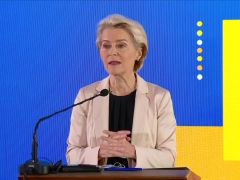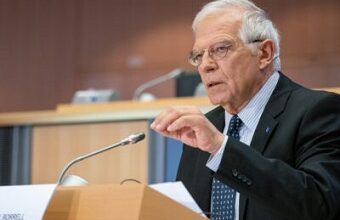On October 27, 2017, the Government of Republika Srpska delivered its 18th Report to the United Nations Security Council. The report advises the Council on the Entity’s positions on a range of issues relevant to the international community’s involvement in Bosnia and Herzegovina. The executive summary of the report is below.
Republika Srpska’s 18th Report to the UN Security Council
Introduction and Executive Summary
I. The Subversion of the Dayton System
Republika Srpska remains committed to Bosnia and Herzegovina (“BiH”) as it is defined and structured in the Dayton Accords. Since shortly after the Dayton Accords entered into effect, the highly decentralized political structure of BiH established in the BiH Constitution has been under attack by the SDA and other Bosniak political parties and their supporters in the international community. They have steadily and unlawfully replaced the Dayton structure with a dysfunctional centralized state. For years, the High Representative used illegal decrees and coercion to pursue the centralization agenda of the SDA and other Bosniak political parties. As the High Representative’s use of the so-called “Bonn Powers” has been discredited and declined in recent years, the SDA has used its domination of BiH institutions—often unlawfully created by decree and coercion—to further erode the autonomy of the two Entities supposedly guaranteed under the Dayton Accords. The BiH Constitutional Court, with its foreign judges, has also been used as a political instrument to unlawfully alter the Dayton structure. As a former chief of staff of the Constitutional Court’s president described, “[C]onstitutional-law development has been exclusively a consequence of international interventionism.” After changes since Dayton, he said, “[t]he constitutional-law organisation does not reflect the formal text of the Constitution.” “The Constitutional Court,” the former chief of staff said, “has granted legitimacy to a host of imposed laws and introduced a balance between BiH sovereignty and international governance.”
II. The BiH Constitutional Court must be reformed.
The BiH Constitutional Court must be reformed to replace its three foreign judges if BiH is to restore the rule of law and prevent further unlawful deterioration of the Dayton Accords. The terms of the BiH Constitution indicate that the parties’ intent was for the foreign judges to be replaced after a five-year transitional period. The Constitutional Court’s legitimacy is undermined by the presence of foreign judges, the court’s lack of independence, and the foreign judges’ alliance with Bosniak judges to act as political instruments of the High Representative and the SDA. As EU officials have made clear, BiH cannot accede to the EU with foreign judges sitting on its Constitutional Court. Moreover, the presence of foreign judges on the court is incompatible with BiH sovereignty and democracy. All of BiH’s Serb and Croat leaders advocate ending the role of foreign judges, but Bosniak parties have blocked this essential reform because they do not want to break up the political alliance of foreign and Bosniak judges.
III. The Bosniaks’ drive to seize RS property used by the BiH military is unlawful and destabilizing.
The Court of BiH’s 2016 Han Pijesak decision ordering RS officials to transfer RS state property to the ownership of the BiH Ministry of Defense is contrary to law, including the Agreement on Succession Issues, BiH and RS law, BiH Constitutional Court jurisprudence, and the Dayton Accords. The decision is part of the Bosniak agenda to centralize power and undermine Republika Srpska. The transfer of RS property being used by the BiH Ministry of Defense is also wholly unnecessary, especially because Republika Srpska already allows the BiH Armed Forces to use all of the state property it needs. Any attempt to prosecute RS civil servants for failure to transfer such property would be unnecessary, unjustified, and unprecedented.
IV. It is right and proper for Republika Srpska to declare its position on NATO membership and, potentially, to hold a referendum on the issue.
The RS National Assembly in October 2017 approved a resolution proclaiming military neutrality with respect to military alliances until a potential referendum on the issue is held. Republika Srpska is well justified in declaring its position—and in potentially holding a referendum—on the issue of BiH’s potential membership in NATO. This is especially so because of the role the BiH Constitution explicitly gives Republika Srpska in treaty ratification. Any claim that BiH has already, by law, committed to NATO membership ignores the BiH Constitution’s clear requirements for ratification of treaties.
V. The BiH justice system, another political instrument that has been used to undermine Dayton, causes significant instability; it must be reformed.
The BiH Court and Prosecutor’s Office are two BiH institutions that the SDA uses for its political agenda. The BiH Prosecutor’s Office has long made investigative and prosecutorial decisions based not on justice but on politics. A recent example is the BiH Prosecutor’s office’s baldly political attempt to imprison four members of the RS Referendum Commission. The BiH justice system has also continued its long pattern of discrimination against Serb victims of war crimes.
VI. The Court of BiH and HJPC must be reformed to meet European and other international standards.
The Court of BiH, an unlawful creation of the High Representative, requires reforms to meet EU standards. Among the necessary reforms is a curtailment of the infinitely elastic jurisdiction claimed by the court and the creation of an independent appeals court. The Court also lacks independence and is often subject to influence by the SDA for political purposes, as international officials and NGOs have critically noted. EU representatives have agreed with Republika Srpska on the need for these reforms. The High Judicial and Prosecutorial Council (HJPC) system, another unlawful creation of the High Representative, must be reformed to be harmonize with BiH’s constitutional structure, European standards, and the practice of democratic federal states. These institutions do not exist under the BiH Constitution and were created by the decrees and political coercion of the High Representative with the support of the Bosniaks to unlawfully centralize judicial power. Republika Srpska has been seeking reforms to BiH’s justice system through the EU’s Structured Dialogue on Justice since 2011, but Bosniak officials have intransigently blocked all proposed reforms, including those endorsed by EU experts.
VII. European Officials and journalists express growing concern over the increasing jihadist threat BiH poses.
Concerns about the use of BiH as a terrorist sanctuary are rising among European officials and journalists. The SDA has helped turn BiH into a safe haven for jihadists, who threaten BiH, Europe, and the rest of the world. Consistent with its Islamist ideology, the SDA invited mujahidin to Bosnia and Herzegovina during the war and has continued its close ties to radical Islamists. As Germany’s Der Spiegel recently wrote, “German investigators believe there are around a dozen places in Bosnia where Salafists — followers of a hardline Sunni interpretation of Islam — have assembled radicals undisturbed by the authorities.”
VIII. The BiH level is obstructing implementation of the Reform Agenda for EU integration.
Republika Srpska has continued to show its commitment to BiH’s EU integration by fulfilling all of its obligations under the EU-sponsored Reform Agenda. Unfortunately, BiH-level institutions have failed to meet their obligations, such as the approval of new excise tax legislation. Despite the BiH level’s failures to meet its commitments, Republika Srpska will continue its strong support for the Reform Agenda and work for agreement on all matters relating to the Reform Agenda consistent with RS constitutional competencies.
IX. The international community should respect the Dayton Accords and BiH sovereignty.
Republika Srpska asks BiH’s friends in the international community to respect the Dayton Accords and BiH sovereignty. The international community should support reforms to restore the Dayton structure, refrain from intervening in BiH’s domestic politics, and close the Office of the High Representative, which is incompatible with BiH sovereignty and EU membership. In addition, the UN Security Council should end the unjustified application of Chapter VII of the UN Charter to BiH.
Republika Srpska will continue its commitment to the Dayton Accords, the Reform Agenda, and other reforms to improve the wellbeing of its citizens.
Read the full report here.


